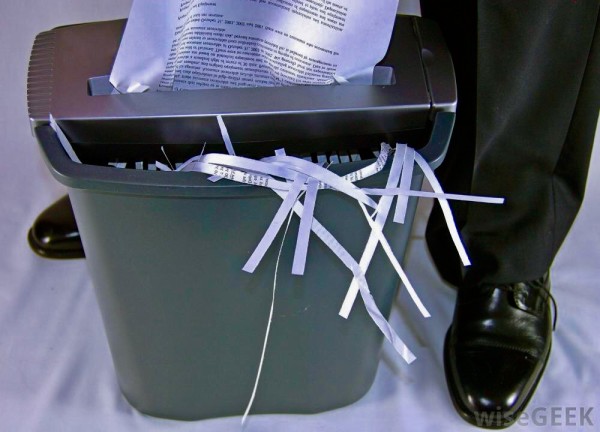
Spoliation of evidence is the intentional destruction of relevant evidence when litigation exists or is pending.
There are few cases on the issue in Canada but it does occur on occasion.
In Holland ( Guardian ad litem) v Marshall 2008 BCCA 468 the appeal court stated re a medical malpractice suit where it was alleged hospital records had been deliberately destroyed:
55 Justice Brooke stated his understanding of the law of spoliation of evidence based on four case authorities to which he was referred by counsel for the respondents. The following is a summary of what was stated:
1. A rebuttable evidentiary presumption arises where evidence of spoliation exists; the doctrine of spoliation is an evidentiary rule raising a presumption and not an independent tort giving rise to a cause of action (St. Louis v. R. (1896), 25 S.C.R. 649 (S.C.C.)).
2. In an appropriate case, destruction of documents carries a procedural but not substantive remedy, an action for damages cannot be sustained solely on the ground that documents have been destroyed (Endean v. Canadian Red Cross Society (1998), 48 B.C.L.R. (3d) 90 (B.C. C.A.)).
3. Spoliation requires four elements in evidence: a) the evidence has been destroyed; b) the evidence destroyed was relevant to an issue in the lawsuit; c) legal proceedings were pending; and d) the destruction of documents was an intentional act indicative of fraud, or an intention to suppress the truth (Dyk v. Protec Automotive Repairs Ltd. (1997), 41 B.C.L.R. (3d) 197 (B.C. S.C.)).
4. There is no common law duty of care to preserve property which may possibly be required for evidentiary purposes; such an obligation can only be imposed by court order granted pursuant to the Rules of Court (Dawes v. Jajcaj, 1999 BCCA 237, 66 B.C.L.R. (3d) 31 (B.C. C.A.), aff’g (1995), 15 B.C.L.R. (3d) 240 (B.C. S.C.), leave to appeal ref’d (2000), [1999] S.C.C.A. No. 347 (S.C.C.)).
56 Justice Brooke accepted the evidence presented by the Hospital that Ms. Holland’s records were destroyed in accordance with its policy in place at the time and not for the purpose of suppressing evidence. He concluded there was no evidentiary foundation for Ms. Holland’s assertion of spoliation on the part of the defendant physicians or the Hospital. In that regard, Brooke J. said:
In Gray v McNeil 2016 ABQB 645 the court found evidence of spoliation had been rebutted by corroborative evidence:
A mother had contents of the deceased’s laptop computer erased days before examination for discovery, and her actions in erasing laptop computer amounted to spoliation .
Counsel for both parties agreed that the laptop would be examined, and the mother engaged in deliberate act to destroy evidence so it was not available for ongoing legal proceedings.
The mother did not merely wipe out evidence of deceased’s private life, but also evidence that could prove or disprove whether and when 2011 will was created on laptop.
Spoliation created presumption that evidence on computer would have been unfavourable to mother, but the presumption was rebutted by other evidence that corroborated mother’s evidence.
Spoliation, which is the intentional destruction of relevant evidence when litigation exists or is pending: McDougall v. Black & Decker Canada Inc., 2008 ABCA 353, 440 A.R. 253 (Alta. C.A.), at para 29. The spoliation of relevant evidence is a serious matter. As was noted in Doust v. Schatz, 2002 SKCA 129, 227 Sask. R. 1 (Sask. C.A.), at para 27 “[t]he integrity of the administration of justice in both civil and criminal matters depends in a large part on the honesty of parties and witnesses. . . . A party is under a duty to preserve what he knows, or reasonably should know, is relevant in an action….”
124 The principle remedy for spoliation is the imposition of a rebuttable presumption that the evidence which was destroyed would not have assisted the spoliator. The presumption can be rebutted by evidence showing the spoliator did not intend, by destroying the evidence, to affect the litigation, or by other evidence that proves her case, McDougall at para 18:
. . . Spoliation in law does not occur merely because evidence has been destroyed. Rather, it occurs where a party has intentionally destroyed evidence relevant to ongoing or contemplated litigation in circumstances where a reasonable inference can be drawn that the evidence was destroyed to affect the litigation. Once this is demonstrated, a presumption arises that the evidence would have been unfavourable to the party destroying it. This presumption is rebuttable by other evidence through which the alleged spoliator proves that his actions, although intentional, were not aimed at affecting the litigation, or through which the party either proves his case or repels the case against him.




